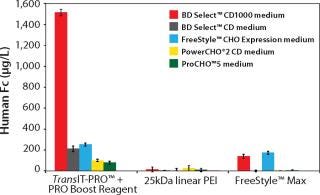Maximize Protein Expression in CHO Suspension CellsMaximize Protein Expression in CHO Suspension Cells
July 1, 2010

Transient transfection in mammalian cell lines provides an avenue for researchers to bridge the development bottleneck and shorten the time to usable protein. The method also maintains post translational modifications crucial for biotherapeutic function. Chinese hamster ovary (CHO) suspension cells are especially suited for high-yield production of recombinant proteins, despite being refractory to commonly used transfection methods (e.g., 25-KDa linear PEI). Mirus Bio has developed a more effective alternative, the TransIT-PRO™ transfection kit. Using this kit increases yields of recombinant protein that can be obtained with minimal optimization of transfection parameters. Transfection complexes are made in serum-free media by adding plasmid dna, TransIT-PRO Transfection Reagent, and the PRO Boost reagent (optional). After incubating complexes for 15–30 minutes, they can be added directly to cells in normal growth media. Transfection using the TransIT-PRO Transfection Kit eliminates the need for a culture medium change post-transfection and is suitable for both transient and stable transfection. For secreted antibody constructs, optimal titers are typically obtained five to seven days post-transfection in batch fermentation.
To demonstrate biotherapeutic relevant protein production a representative human IgG1 was expressed in CHO suspension cells using multiple transfection methods including: TransITPRO™ Transfection Kit, 25-kda linear PEI or FreeStyle™ Max Transfection Reagent. Figure 1 demonstrates expression of a human IgG1 construct by Western blot using supernatants collected at day 7 post-transfection using FreeStyle™ CHO-S cells grown in FreeStyle™ CHO medium. In this system, the TransIT-PRO Transfection Kit and FreeStyle Max Transfection Reagent perform similarly, outperforming 25-kDa linear PEI by three-to five-fold.

Figure 1: ()
Make Protein Production Turnkey
TransIT-PRO is Compatible with Multiple CHO Media Formulations: Cell culture growth medium has a considerable influence on transfection efficiency. To further examine these effects, FreeStyle CHO-S cells were adapted to five representative growth media including BD Select™ CD1000 medium, BD Select™ CHO medium, FreeStyle CHO expression medium, PowerCHO®2 CD medium, and ProCHO™5 medium. Cells adapted to the appropriate media were transfected with a plasmid encoding a human IgG1 antibody construct using multiple transfection methods including: Transit-Pro transfection kit, 25-kDa linear PEI, and FreeStyle Max transfection reagent (Figure 2). Clarified supernatants were analyzed using a human IgG-Fc sandwich ELISA. The media formulation impacted transfection efficiencies by >10-fold within a given transfection methodology.

Figure 2: ()
Not all commercially available transfection reagents had broad-spectrum media compatibility. At least a 10-fold increase in IgG yield was obtained when the TransIT-PRO Transfection Kit was used in conjugation with FreeStyle CHO-S cells adapted to BD-Select CD1000 medium (Figure 2, red bars). Similar to Figure 1, comparable results were obtained with the TransIT-PRO Transfection Kit and FreeStyle Max with CHO-S cells adapted to FreeStyle CHO medium (Figure 2, blue bars). Notably, in many media formulations (BD Select CHO, ProCHo5 and PowerCHO2 CD) the Transit-Pro Transfection Kit provided detectable levels of expression, significantly outperforming 25-kda linear PEI and FreeStyle Max transfection reagent.
Scale-Up: No Problem
These results demonstrate that high protein titers can be obtained with transient transfection using the TransIT-PRO Transfection Kit and many chemically defined media formulations. Transfections are scalable from 2-mL to 400-mL culture volumes (data not shown). The TransIT-PRO Transfection Kit provides an alternative to FreeStyle Max reagent and outperforms linear PEI, saving valuable time and research costs. TranIT-PRO uses components free of animal origin designed for high and reproducible protein production in suspension CHO cells.
About the Author
Author Details
Dr. Laura Juckem is R&D Group Leader at Mirus Bio, 545 Science Drive, Madison, WI 53711; 1-608-441-2852, [email protected], www.thetransfectionexperts.com.
You May Also Like





